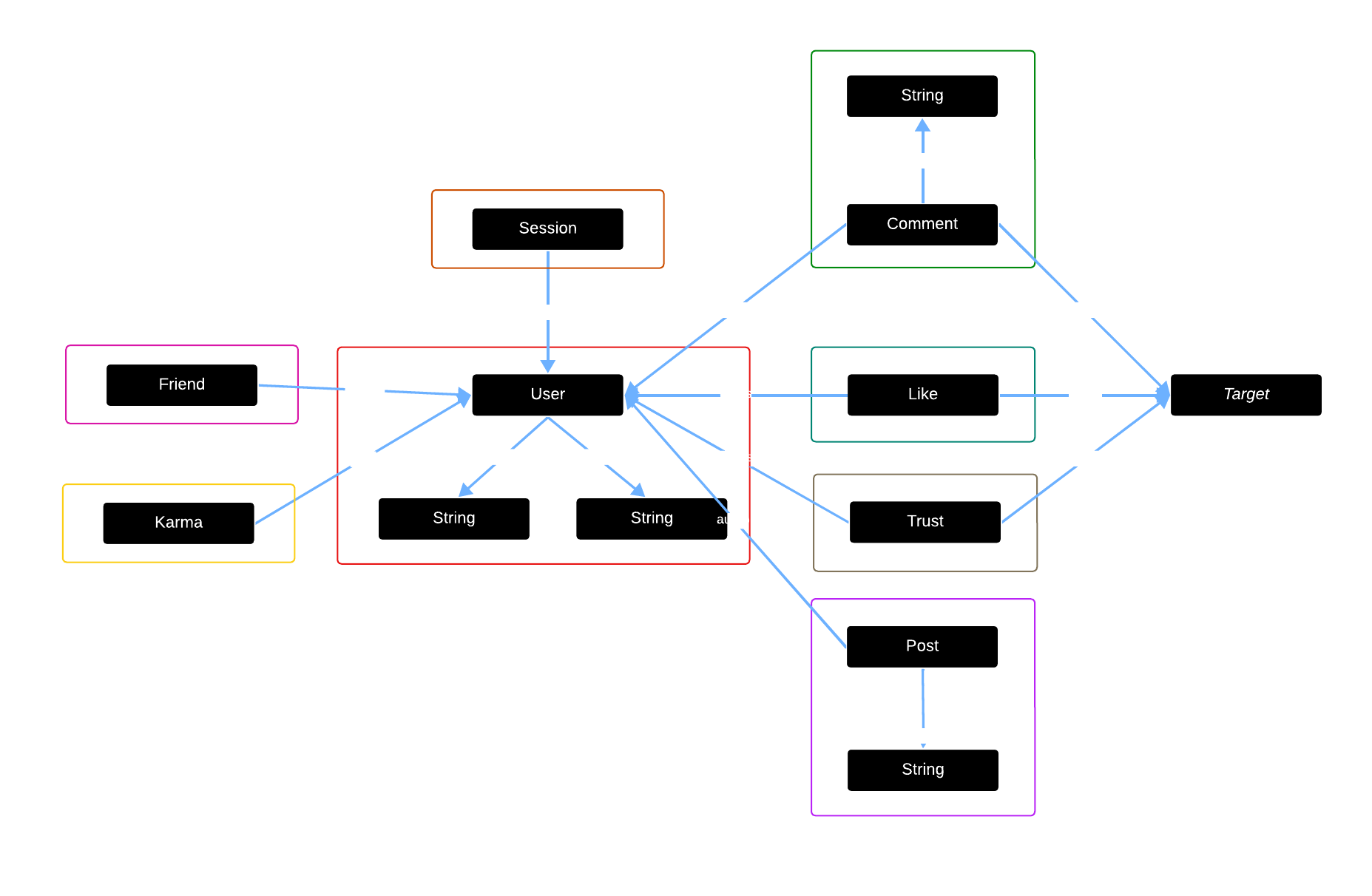Assignment 4: Backend Design & Implementation
Abstract Data Models
All of these were taken from here
User
User State Machine
concept User
purpose authenticate a partipicant of RealTalk
state
registered: set User
username, password: registered -> one Stringactions
register(n, p: String, out u: User)
u not in registered
registered += u
u.username := n
u.passowrd := pauthenticate(n, p: String, out u: User)
u in registered
u.username = n and u.password = poperational principle
after a user registers with a username and password, they can authenticate with that same username and password
after register(n, p, u), u in registered, u.username = n, u.password = p; authenticate(n, p, u') results in u = u'
Session
Session State Machine
concept Session [User]
purpose authenticate users for an extended period of time
state
active: set Session
curUser: active -> one Useractions
start(u: User, out s: Session)
s not in active
active += s
s.curUser = uend(s: Session)
s in active
active -= sgetUser(s: Session, out u: User)
s in active
u := s.curUseroperational principle
after a session starts until it ends, getUser returns the same user that started the session
after start(u, s) until end(s, u), getUser(s, u') results in u = u'
Friend
Friend State Machine
concept Friend [User]
purpose increase connections between others
state
friends: User -> set User
actions
friend(u1, u2: User)
u1.friends += u2
u2.friends += u1unfriend(u1, u2: User)
when u2 in u1.friends
u1.friends -= u2
when u1 in u2.friends
u2.friends -= u1areFriends(u1, u2: User, out b: Boolean)
when u2 in u1.friends or u1 in u2.friends
b := True
otherwise
b := Falseoperational principle
after a user friends another user, they are both considered each others friends until one of them unfriends the other
after friend(u1, u2) until unfriend(u1, u2), u2 in u1.friends, u1 in u2.friends, and areFriend(u1, u2, b) results in b = True
Post
Post State Machine
concept Post [User, Content]
purpose share content with others
state
posts: User -> set Post
content: Post -> one Content
author: Post -> one Useractions
post(u: User, c: Content, out p: Post)
p.content := c
p.author := u
u.posts += punpost(u: User, p: Post)
when p in u.posts u.posts -= p
forget content of p
forget author of poperational principle
after post(u, p, c) until unpost(u, p), p in u.posts, u = p.author, and c = p.content
Comment
Comment State Machine
concept Comment [Target, User, Content]
purpose react to other content
state
comments: Target -> set Content
author: Content -> one Useractions
comment(t: Target, u: User, c: Content)
t.comments += c
store u as author c is fromuncomment(t: Target, u: User, c: Content)
when the author of c is u
t.comments -= c
forget author of coperational principle
after comment(t, u, c) until uncomment(u, c), c in t.comments and u is author of c
Like
Like State Machine
concept Like [Target, User]
purpose show approval or disapproval of information
state
likes, dislikes: Target -> set User
actions
like(t: Target, u: User)
t.likes += u
dislike(t: Target, u: User)
t.dislikes += u
neutralize(t: Target, u: User)
when u in t.likes
t.likes -= u
when u in t.dislikes
t.dislikes -= uoperational principle
after like(t, u) until dislike(t, u) or neutralize(t, u), u in t.likes
after dislike(t, u) until like(t, u) or neutralize(t, u), u in t.dislikes
Trust
Trust State Machine
concept Trust [Target, User]
purpose show agreement or disagreement with the truthfulness of information
state
trusts, mistrusts: Target -> set User
actions
trust(t: Target, u: User)
t.trusts += u
mistrust(t: Target, u: User)
t.mistrusts += u
neutralize(t: Target, u: User)
when u in t.trusts
t.trusts -= u
when u in t.mistrusts
t.mistrusts -= uoperational principle
after trust(t, u) until mistrust(t, u) or neutralize(t, u), u in t.trusts
after mistrust(t, u) until trust(t, u) or neutralize(t, u), u in t.mistrusts
Karma
Karma State Machine
concept Karma [User]
purpose show how truthful a user is
state
karma: User -> one Integer
actions
increase(u: User)
when u in karma
u.karma := u.karma + 1
when u not in karma
u.karma := 1decrease(u: User)
when u in karma
u.karma := u.karma - 1
when u not in karma
u.karma := -1operational principle
after increase(u) until decrease(u), u.karma is 1 more than before
after decrease(u) until increase(u), u.karma is 1 less than before
App State Diagram

Design Reflection
When designing comments, likes, and trusts, I did not consider that I would have to ensure their target existed before trying to apply the comment, like, or trust to the target. When actually implementing comments and likes, I realized I had to check to make sure a comment wasn't applied to a comment, or a like wasn't applied to a user. I did this by checking the ObjectId of the target and ensuring it existed as a post. I could have allowed commenting, liking, or trusting any target, but this could result in liking likes which is extremely strange for a social media.
When implementing the karma system dependent on trusts and mistrusts, I ran into two bugs that allowed infinite karma farming. The first bug was simply trusting over and over again. Even though an error was returned, the backend code didn't check for an error before increasing karma. This was easily fixed by checking for an error before touching karma. The second bug was more complicated. User A could trust, mistrust, and then neutral trust User B's post or comment, causing a net karma of +1. This was caused by the backend code not checking the previous trust state of a target. For example, a trust would always give +1 karma, even if the post was previously mistrusted by the same person. In that case, it should give +2 to offset the -1 from a mistrust, and vice versa for trust to mistrust.